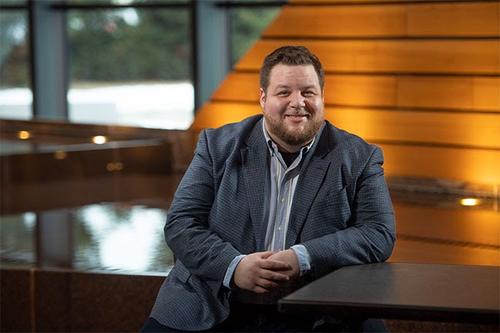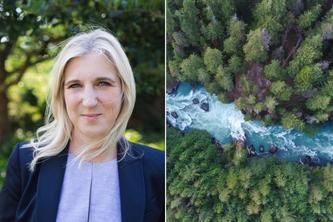
Writer, performer, and educator Benjamin Alfaro has a vision to shape cities into inspired, inclusive, thriving places. The Detroit native believes that arts and community organizations are central to that transformation.
As a student in the Master of Professional Studies in Arts and Cultural Leadership program, he is driven to gain a deeper understanding of how different groups of people treat public space and, he says, “how planners can develop robust and creative cities that will resist gentrification, displacement, and harm to working-class families.”
Alfaro, who majored in urban studies as an undergraduate, has taught in hundreds of classrooms, libraries, and community centers as a poetry teacher and group facilitator. He also organized a high school poetry festival that convened schools and organizations from across Michigan and launched the Detroit Youth Poet Laureate prize.
He’s a firm believer in the power of art to lift up communities.
“A poem in itself may not change the world, but the insight, reflection, and conversation that a poem can bring about can directly impact the lives of people and places,” he says.
Alfaro’s knowledge of how cities grow and change has informed his studies. “It helped me reconcile that place, whether a broad geography or an intimate setting, is always operating as a muse in some capacity.”
Before moving to the Twin Cities, Alfaro explored other master’s degrees in fine arts, public administration, and urban planning, but found most options limited in scope.
The arts and cultural leadership program is unlike any other program being offered in the country, he says. “I can take classes from the arts, social sciences, and management departments to tailor my learning.”
Alfaro’s elective courses focus on urban spatial equity, and his goal is to master the technical and professional skills to lead a creative and community-driven organization.
“This program is ideal if you believe the arts are at the root of what you want to do professionally,” he says. “Because of its flexibility, the program allows for more scaffolding than an arts administration degree and more professional pathways than an MFA.”
It’s also a pathway that allows for flexibility in its completion, beyond more traditional two-year programs.
“Something to remember is that the arts and cultural leadership degree is a professional degree,” says Alfaro. “So there's no urgency to complete it in two years—take your time, get what you need.”
This story was adapted from "Inspired by and for Urban Spaces," from the College of Continuing and Professional Studies.
Photo credit: Craig Lassig
- Categories:
- Science and Technology





